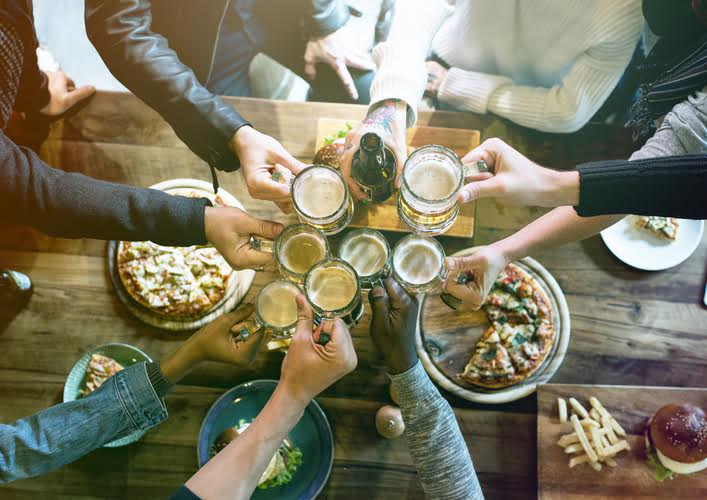Choosing one at the end of a long day isn’t easy, but you’ve got powerful incentives working for you and lots of choices below. The compensation we receive from advertisers does not influence the recommendations or advice our editorial team provides in our articles https://youngstaremancipation.org/how-to-get-rid-of-a-hickey/ or otherwise impact any of the editorial content on Forbes Health. One might assume that perhaps a light beer is the best way to end a long day in the office but in fact, it was found that over 1 in 10 workers say they drink shots during afterwork drinks.
Is Drinking After Work Getting Out of Control?
People with alcohol use disorder who quit drinking often have trouble sleeping. Cognitive behavioral therapy for insomnia (CBTi), medication, or a referral to a behavioral sleep specialist can help. If you drink heavily for weeks, months, or years, you may have unwanted physical and mental symptoms when you try to stop. It’s often a relief to knock back a drink or two after a long day at work, and as an added incentive, happy hour is usually from 4–6 p.m., coinciding perfectly with the end of the workday. After work drinks are the perfect excuse to celebrate the end of a successful project or the start of a big one. But sometimes, one drink leads to two or three, and before you know it, you’ve bought a couple rounds for the entire office.
Yes, After-Work Drinking Is a Serious Workplace Issue
In seeking professional help, it is crucial to consult with a primary care provider or seek referrals to specialists with addiction expertise. Trusted resources include the Substance Use Treatment Facility Locator and reputable organizations such as the National Institute on Alcohol Abuse and Alcoholism (NIAAA) and the Association for Addiction Professionals (NAADAC). It’s essential to acknowledge that reducing or quitting alcohol can significantly improve both physical and mental health, and professional help can offer the necessary guidance and support for this journey.
- Typically, all cases of addiction begin with medically assisted detox.
- It’s easy to fall into the mentality of ‘I work out to drink,’ but that ultimately doesn’t set you up for success in or out of the gym,” Mayer says.
- Each offers different forms of treatment, such as medications, behavioral therapy, and support systems, tailored to individual needs.
- Drinking or using drugs at work can cost you your job, but it doesn’t stop people from doing it.
Finding Treatment for Alcohol Addiction

Maintaining your control over the situation and taking the safer route can save you trouble in the long run. While having a drink initially may be fine, if it begins to escalate into alcohol abuse, saying ‘no’ is the best route to take before it’s too late. The Recovery Village Columbus offers several treatment options, including medical http://www.infopiter.ru/business/bus3.html detox, inpatient rehab, and more, to provide you with personalized care at our Joint Commission-accredited facility. Contact a Recovery Advocate today to take the first step toward living an alcohol-free life. Getting help for alcoholism at The Recovery Village Columbus can greatly improve the chances of overcoming alcohol addiction.

- Dependence is a condition that can lead to alcohol use disorder (AUD), characterized by an inability to manage drinking habits despite negative personal and health consequences.
- The after-work drinking culture is a prevalent social phenomenon where alcohol serves as a symbol of relaxation, camaraderie, and an antidote to work-related stress.
- For those looking to replace their post-work cocktail, herbal teas, alcohol-free spirits, and innovative non-alcoholic beverages offer a variety of flavors and experiences.
- A staggering 42% of workers admitted to having gone to work hungover or under the influence of alcohol, with 9% doing so in the past six months alone (source).
It can potentially lead to stress and mood disorders, including depression and anxiety. Long-term use can alter brain function, affecting mood and cognition, as well as worsening mental health conditions like anxiety, depression, and bipolar disorder. Socially, habitual after-work drinking can lead to irresponsible behavior, strained professional relationships, and impaired work performance. Those in the professional class also struggle with substance abuse, possibly fueled by after work drinking. Those with professions such as office workers, lawyers, doctors, accountants, and management, may also find themselves struggling to control their drinking habits. For example, nearly one in five lawyers struggle with heavy alcohol use.
- Made with fresh blueberries, sweet and sour mix, agave syrup, lemon juice, and Jack Daniel’s whiskey, this cocktail is bursting with flavor and is sure to impress your taste buds.
- Opting to have some sparkling water or a soda can be viable alternatives.
- “As a nondrinker, I feel that pressure to fit in and not look awkward,” she says.
- This includes efforts to improve overall wellness and, for some, to support weight loss endeavors.
- These rituals can contribute to a culture where alcohol becomes an implicit requirement for socializing, potentially excluding or pressuring those who abstain.
It’s important to ease this stress without always resorting to https://bemoxie.org/myrrh-extract-what-are-the-health-benefits/. While it is okay to enjoy a drink here and there, it is not normal to rely on drinking. This systemic approach underscores the need for comprehensive solutions to address the intertwined issues of alcohol use and mental health disorders. As workplace drinking culture comes under scrutiny, it becomes clear that alternative, more inclusive team-building activities should be explored to foster a healthy work environment. According to a BBC report, in the UK, private sector employees are more likely to perceive an expectation to drink at employer events compared to their public sector counterparts.
